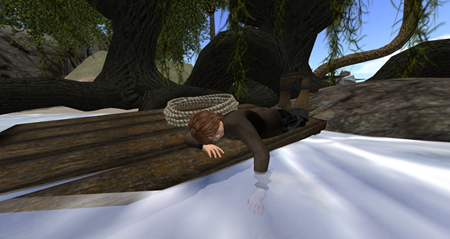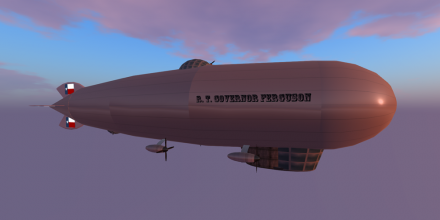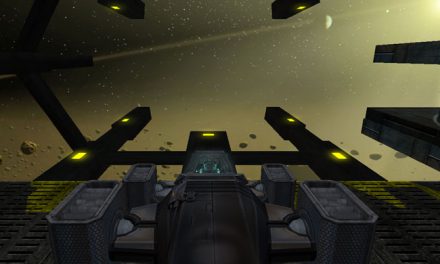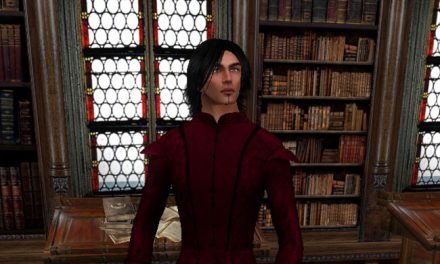 Captain of the Clouds
Captain of the Clouds
By Lou Antonelli
The Second Confederacy used unremarkable biplanes to patrol the border, but the greater Texas Republic used helium-filled dirigibles on its side of the Mississippi River—and Billy Greer knew each one by sight.
The airship on patrol that summer along the Mississippi-Louisiana border in 1936 was the Gov. Ferguson. During the summer Billy and his friends would wait every afternoon to see it float past Natchez. This afternoon, though, Billy was alone. Some of his friends had been distracted by a report of a dead cat run over on a nearby street. Billy took advantage of being alone to do something he’d been wanting to do for a long time.
On the banks of the river below the Natchez Trace there was a communal Huck Finn-type raft which had been assembled by the local boys from old pallets and planks. Billy had always wanted to see an airship up close, but that would mean you would have to go to the far side of the river. The dirigible always stayed on the Louisiana side of the mid-river boundary.
In the past, the boys had debated amongst themselves how dangerous it was, and always managed to talk themselves out of it. Today, Billy decided, he was going to do it himself.
He set out into the river as the first spied the Gov. Ferguson on the northern horizon. The silvery aluminum exterior glinted in the late afternoon sun. He estimated that he would be in position on the Louisiana side of the river by the time the aircraft reached him.
He used a rudder and an oar to maneuver himself. Despite it being a seat-of-the-pants operation, his plan worked. The river was at a slow and sluggish summer’s pace, with no currents or eddies strong enough to drive him off course. He sweated profusely, but he succeeded.
It was an impressive sight. The aircraft was 1000 feet long, and it flew only 200 feet above the river by the time it reached Natchez. Billy had the best seat in the house.
He noticed the ship shuddered slightly as it passed—as if the steering wheel was being shaken—and then he saw a panel open on the underside. Then a mannequin on a rope fell out.
Billy snapped his mouth shut when he realized the “mannequin” was kicking its legs.
It was obvious from the man’s body language that he was looking up frantically as he quickly lowered himself down the full length of the rope, which extended halfway to the water. In a moment he was all the way down. Then the rope went limp and plunged down past him.
The man spread-eagled himself like a parachutist, obviously intent to slow his descent. Billy began paddling furiously in his direction. In a moment the man crashed into the Mississippi River.
Billy could hear the engines of the airship rev up as it sped down the river, veering inland towards the Mississippi side.
By the time Billy reached where the man had plunged into the water, all he saw were diminishing air bubbles.
Billy was a good swimmer, but there was no way he could try to dive and search for the man. Then he saw the bubbles increasing. A moment later the man’s head broke the surface.
He gasped for air and groaned. Billy called out to him.
“Over here mister, I’m over here!”
The man laboriously turned around as he treaded water and Billy continued to paddle towards him. As he drew close, Billy extended the paddle and the man grabbed it.
In a moment the man had pulled himself to the edge of the raft. Billy grabbed him by the shoulders.
“Thanks kid, you’re in the right place at the right time!” the man rasped.
He floated there for a minute, his arms locked on the edge of the raft, as he caught his breath.
“What happened mister? Did you have an accident?”
The man looked up at Billy. “No son, it’s a mutiny—a hijacking. They were throwing me overboard, but I managed to a grab a line to break my fall.”
They both heard a motor and turned to see a speedboat coming from Natchez under the Hill. In a minute it reached them. The Mississippi state trooper behind the wheel looked startled as he saw the man bobbing in the water.
“Dear God, Captain August! What happened?”
Billy took a good look and realized with a start he had rescued the most famous dirigible captain on the Mississippi River.
The trooper stretched out his arms. “Let’s get both of you in this here boat, and back to shore, pronto!”
He pulled the airship captain in and then gestured to Billy.
“But my raft!”
“To the devil with your raft,” the trooper said. “I’ll buy you a rowboat. We need to get back!”
He quickly hauled Billy in, and gunned the engine as he headed back to Natchez.
“What happened up there?” asked the trooper.
“The crew was infiltrated. They jumped my men at mess, and then confronted me and the navigator in the cabin,” August said. “They made him steer at gunpoint, but they grabbed me and dragged me to the hatch.”
“That fall would have killed you!”
“I’m glad I saw the rope and grabbed it as they shoved me out,” August said. “Thank god the boy was right there,” August said as he grabbed Billy by the shoulder. “I might have gone under before you got to me.”
There was no radio on the motorboat, but the trooper hopped onto the dock when they pulled in and spoke to some Natchez city policemen, who ran to their patrol cars and got on the radio.
The airship captain turned to Billy. “Son, I’ve got to run, we’ve got some hijackers to catch. But thanks for getting me out of the river.”
He extended his hand.
Billy went to shake it, and as Capt. August pumped it, Billy felt a coin in his palm. He looked down to see a gold double Eagle.
Billy’s eyes got wide and he looked up at the famous Captain of the Clouds in awe.
The airman winked at him and smiled. Billy stood at the end of the dock as the adults left to go on a manhunt.
#
Word quickly spread across the small city. The next morning the headlines in the Natchez Democrat told the story:
“Capt. August eludes death with help of 11-year old”.
“Authorities baffled—Airship vanishes!”
“U.S. tells Texas Germany probable culprit.”
The German regime led by the bitter ex-corporal who was gassed in the Great War was itching for a rematch with the U.K. and France—secure in the knowledge that this time, the U.S. would not have the resources to come to the aid of them.
Indeed, the U.S. was a shadow of itself after the Spanish Flu pandemic killed 60 percent of its population. What started as the quarantine between states led to “E Pluribus Unum” becoming “E Pluribus Sixtus” as the central government weakened.
But the rump U.S. President Al Smith in Washington still had enough clout to convince President Huey Long in Greater Texas not to sell the Germans any helium for their airships.
The next morning Billy’s faced glowed brighter than the double eagle Capt. August had given him. All the neighbors wanted to see him, and the other children were pop-eyed in amazement.
Just the previous week, they had seen the newsreel at the Odeon on how the famous airship captain marked the tenth anniversary of patrolling the Mississippi along the Arkansas and Louisiana shores for the Greater Texas Republic.
Between rum runners—Prohibition was still in effect in the Second Confederacy—arms smugglers trying to supply the Mormon insurrection in the Rocky Mountain Republic, and tariff cheats, Capt. August and his small but efficient crew made headlines constantly because of their effectiveness.
“He combines the morals of a Boy Scout with the determination of a U.S. G-man,” wrote a reporter for the Minneapolis Star earlier in the year, in a piece explaining how the stable Texas-Confederacy border benefitted the remnants of the United States which now only straddled the Upper Mississippi.
Mrs. Greer insisted Billy go to school that day— “Honey, he musn’t get a swelled head!”—but that had the opposite effect. Billy was the object of everyone’s attention. Even the teachers stared at him, and talked among themselves.
That afternoon, The Captain of the Clouds himself appeared at the door of Billy’s classroom. He was accompanied by a Confederate Secret Service agent.
Capt. August winked at Billy as they spoke to his teacher, who then called Billy to her desk.
“Son, both President Long and President Bilbo have agreed to let Captain August participate in the search for his airship, since it was last seen crossing over into our state,” the CSS agent said. “Once his airship is recaptured, he would like to have you join the crew as an apprentice airman.”
“Would you like to help me stop smugglers and spies?” asked August.
“Would I! When do we start?”
“First, I need to get my ship back. And you can help me find it,” August said, bending at the knees. “How well do you know Natchez?”
“I know it like the back of my hand,” Billy said.
“Good, you can help me in the search!” August said as he stood up.
“Smart public relations, bringing the kid on board,” the CSS agent side-mouthed.
August turned so they were face to face.
“Yes, but he really can help, wait and see,” he said. “I have a gut feeling about this. I can still fly by the seat of my pants.”
#
After a brief visit to Billy’s parents, Capt. August and Billy were driven to the Mississippi state militia’s barracks, where the war room for the search was based.
“Stay here on the sidelines and wait, you’re going to be going out on a search,” said August to Billy.
August went over to a table and spoke to a cluster of troopers and agents as he pointed to Billy.
Billy could see they were poring over a large map.
“The airship was last seen heading towards an area of cotton fields and tobacco farms,” an agent said. “No one lives there, you could lose the moon over that county.”
“Yes, but if it didn’t continue on, where could it be?” asked another.
“If the krauts stole the airship for its helium, they still need to park it someplace while they drain it,” a third said. “We’ll see it from the air.”
“It may be camouflaged by now,” August said. “Still, they’ll need to smuggle the helium out somehow.” He nodded in Billy’s direction. “That’s why I brought along my Baker Street Irregular. He’d notice something out of place.”
He gestured to a state trooper. “Drive him all around this county, and Franklin County, where my ship was last seen. Let’s see if he notices anything unusual or anyone out of place.”
August went over to Billy. “I want you to go on a scouting patrol. This trooper is going to drive you all around Adams County, and then you’re going to go out to Franklin County. If you see someone you think looks hinky, or something strange, tell him.”
He shook Billy’s hand very seriously. “You’re my apprentice now,’ he said as he saluted him.
“Yes sir!” Billy barked, returning the salute.
They left, and August went back to the table.
“I don’t see why you think the kid can help,” said a trooper.
“He’s young and uncorrupted, and eager,” August said. “Another set of eyes can’t hurt. Besides, I’m serious. A kid like him, with all his moxie—I mean, damn, he fished me out of the Mississippi!—I want him as an apprentice on my airship.”
#
The rest of the afternoon and evening the trooper and Billy were on patrol in Natchez, and then they left Adams County for Franklin County. Billy peered out the open window of the patrol car like a German police dog, but nothing caught his attention.
Back in Natchez that night, the trooper stopped to get himself and Billy a moon pie and an RC Cola before dropping Billy off at home. While the trooper was in the store, Billy noticed a large open truck loaded with pressurized tanks being fueled up.
The shiny sign on the side said “Rachen’s Welding Service, Natchez, Ms”.
When the trooper sidled back into the patrol car, Billy pointed to the truck.
“I’ve never seen that truck here before,” he said.
The trooper squinted. “That’s a lot of acetylene to be carrying. Come to think of it, who’d be welding this time of night?”
He opened his door. “Stay inside, but if something happens, get on the radio.”
The trooper walked around the back of the truck and saw the driver, who was leaning on the side smoking.
The trooper drew his weapon. “Put your hands up, now!”
The cigarette fell from the driver’s mouth as he reached for a shoulder holster. The trooper shot him in the chest. A second man came around the front, but when he saw the trooper had him in his sights, he threw his gun down.
The attendant who’d been pumping the gas came around the back, arms raised.
“Don’t shoot!”
“That’s okay, boy, I was talking to these two here,” the trooper said. “I think we just flushed ourselves out two spies.”
He kept his gun trained on the man at the front. Billy came running up behind him.
“I called the barracks on the radio!”
“Good job! You and the boy here take my handcuffs and put them on our friend here while I keep a bead on him.”
#
Billy was sucking down the last of his RC as he listened from his corner in the barracks.
“Your hunch was right, those tanks are full of helium, not acetylene,” said a CSS agent. “They were planning to sneak the helium to New Orleans in truckloads.”
“I wasn’t much of a hunch,” the trooper said. “The kraut was smoking. No welder smokes around acetylene.”
He nodded to August. “Besides, it was the kid who noticed the truck. You were right, he’d see something we’d otherwise overlook.”
Another CSS agent spoke up. “Still, that’s only a fraction of the airship’s helium in those tanks.”
“There’s probably a bunch of other trucks already on the road” August said.
“All the roads are being watched,” the CSS agent said. “We’ll get them.”
“What about my ship?” asked August.
“The spy says it’s hidden in a tobacco barn in Franklin County,” the agent said.
“A tobacco barn?”
“Yes, it’s long enough to hold it. They brought it flat on the ground and dragged it in. That’s all that was needed, they never planned to fly it out.”
“Bastards! They probably banged it all to hell,” August snarled.
A florid face interposed itself between the two men.
“Don’t worry, Charlie, we’ll have you back up in the air in no time!”
The CSS agent drew back. “President Long!”
“Took a quick flight over from Baton Rouge to offer my personal congratulations,” said the Greater Texas President as he shook August’s hand.
The Captain sniffed at the fumes. “It’s really because of the help of the Mississippi troopers, and also my young apprentice airman over there.”
“Yes, and I have already telegraphed my thanks to President Bilbo,” Long said. “Is that the boy I read about? The boy who hauled you out of the river when they gave you the heave-ho?”
Billy had fallen sound asleep in the corner.
“It is,” August said. “Let him sleep. Tomorrow he starts a new life.”
#
“Trey” Greer gazed from the gondola of the aerostat at Natchez on its bluff above the Mississippi River.
“This is it,” said Col. William G. Greer (Ret.) of the Greater Texas Airship Corps. “This is where I was floating on the raft when the German agents stole the Gov. Ferguson and threw Captain August overboard.”
“Wow, I’ve never been here before,” said Billy Greer III. “Y’all caught them the next day. What a story!”
“I fell asleep at the barracks that night. They brought me home and put me to bed–I never woke up. President Long was in town, and he gave me a medal at an assembly at school the next day. The Germans never got their helium. It was a major international incident. General Goering led the coup that toppled Hitler a few days later.”
“And August took you aboard the airship as soon as it was relaunched?”
“I started as a cabin boy, and by the time he retired in 1962, I had worked my way up the ranks to replace him as captain. Between the two of us, we patrolled the Mississippi River 75 years.”
“What ever happened to Captain August, anyway?” asked the grandson. “After he left the Airship Corps, he like disappeared.” The teenager looked down the Mississippi towards the Gulf of Mexico. “It was like he just went off in an airship into the clouds.”
Bill Greer stood next to his grandson. “Nothing quite so dramatic. He went to live back where he grew up, which was Minnesota. Nobody knew he was there. He’d had enough limelight, he enjoyed the peace and quiet.”
“Minnesota? I thought he was a Texan!”
“No, he adopted a new identity when he joined up with Greater Texas. He was making cross country mail runs when things fell apart because of the pandemic. Texas was looking for top-notch airmen for its own air force, and he joined up. They offered a good signing bonus, when they—assembled their own air force. Like when you join the foreign legion, he took a new name.”
He smiled at his grandson. “He was a Swede from Minnesota. He really didn’t change his name, just dropped the last part. His full name was Charles Augustus Lindbergh. When he joined up with Texas, he just shortened it to Charlie August. When he retired, he went back to living as Charles Lindbergh in Little Falls, Minnesota. He passed away 20 years ago.”
The shadow of the aerostat seemed as long as Natchez atop the river’s bluff.
“Wow, I didn’t know that! I wonder what would have happened if he had stayed in the U.S. and flew airplanes instead?” Trey asked.
“Who knows? He probably would have flown the mail run 10, 20 years or until he crashed. Airplane pilots are a dime a dozen.”
The retired colonel smiled an almost childish grin as they passed by Natchez.
“He never would have been The Captain of the Clouds!”
The old man looked down, and for a second— just for a second—he thought he saw a homemade raft floating on the Mississippi.
-The End-





Nice story! Alternative history is a fertile ground for the imagination.